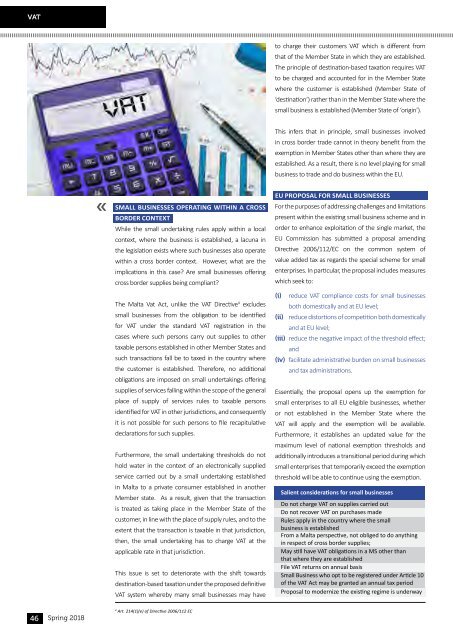ACCSPRING18_ONLINEVER
You also want an ePaper? Increase the reach of your titles
YUMPU automatically turns print PDFs into web optimized ePapers that Google loves.
VAT<br />
to charge their customers VAT which is different from<br />
that of the Member State in which they are established.<br />
The principle of destination-based taxation requires VAT<br />
to be charged and accounted for in the Member State<br />
where the customer is established (Member State of<br />
‘destination’) rather than in the Member State where the<br />
small business is established (Member State of ‘origin’).<br />
This infers that in principle, small businesses involved<br />
in cross border trade cannot in theory benefit from the<br />
exemption in Member States other than where they are<br />
established. As a result, there is no level playing for small<br />
business to trade and do business within the EU.<br />
SMALL BUSINESSES OPERATING WITHIN A CROSS<br />
BORDER CONTEXT<br />
While the small undertaking rules apply within a local<br />
context, where the business is established, a lacuna in<br />
the legislation exists where such businesses also operate<br />
within a cross border context. However, what are the<br />
implications in this case? Are small businesses offering<br />
cross border supplies being compliant?<br />
The Malta Vat Act, unlike the VAT Directive 4 excludes<br />
small businesses from the obligation to be identified<br />
for VAT under the standard VAT registration in the<br />
cases where such persons carry out supplies to other<br />
taxable persons established in other Member States and<br />
such transactions fall be to taxed in the country where<br />
the customer is established. Therefore, no additional<br />
obligations are imposed on small undertakings offering<br />
supplies of services falling within the scope of the general<br />
place of supply of services rules to taxable persons<br />
identified for VAT in other jurisdictions, and consequently<br />
it is not possible for such persons to file recapitulative<br />
declarations for such supplies.<br />
Furthermore, the small undertaking thresholds do not<br />
hold water in the context of an electronically supplied<br />
service carried out by a small undertaking established<br />
in Malta to a private consumer established in another<br />
Member state. As a result, given that the transaction<br />
is treated as taking place in the Member State of the<br />
customer, in line with the place of supply rules, and to the<br />
extent that the transaction is taxable in that jurisdiction,<br />
then, the small undertaking has to charge VAT at the<br />
applicable rate in that jurisdiction.<br />
This issue is set to deteriorate with the shift towards<br />
destination-based taxation under the proposed definitive<br />
VAT system whereby many small businesses may have<br />
EU PROPOSAL FOR SMALL BUSINESSES<br />
For the purposes of addressing challenges and limitations<br />
present within the existing small business scheme and in<br />
order to enhance exploitation of the single market, the<br />
EU Commission has submitted a proposal amending<br />
Directive 2006/112/EC on the common system of<br />
value added tax as regards the special scheme for small<br />
enterprises. In particular, the proposal includes measures<br />
which seek to:<br />
(i) reduce VAT compliance costs for small businesses<br />
both domestically and at EU level;<br />
(ii) reduce distortions of competition both domestically<br />
and at EU level;<br />
(iii) reduce the negative impact of the threshold effect;<br />
and<br />
(iv) facilitate administrative burden on small businesses<br />
and tax administrations.<br />
Essentially, the proposal opens up the exemption for<br />
small enterprises to all EU eligible businesses, whether<br />
or not established in the Member State where the<br />
VAT will apply and the exemption will be available.<br />
Furthermore, it establishes an updated value for the<br />
maximum level of national exemption thresholds and<br />
additionally introduces a transitional period during which<br />
small enterprises that temporarily exceed the exemption<br />
threshold will be able to continue using the exemption.<br />
Salient considerations for small businesses<br />
Do not charge VAT on supplies carried out<br />
Do not recover VAT on purchases made<br />
Rules apply in the country where the small<br />
business is established<br />
From a Malta perspective, not obliged to do anything<br />
in respect of cross border supplies;<br />
May still have VAT obligations in a MS other than<br />
that where they are established<br />
File VAT returns on annual basis<br />
Small Business who opt to be registered under Article 10<br />
of the VAT Act may be granted an annual tax period<br />
Proposal to modernize the existing regime is underway<br />
46 Spring 2018<br />
4<br />
Art. 214(1)(e) of Directive 2006/112 EC

















